Writers Ivan Natividad & Lin Yang
Illustrator Julia Kuo
America’s Southern states used to be a bastion for discrimination
against minorities, with the reins of power concentrated in the hands
of mostly white and mostly male political leaders. But as barriers to
civic participation fell after the 1960s civil rights movement, more
minority communities, including Asian Americans, began gaining political
leverage and sending their members to higher offices and leadership positions.
The Southern crop of Asian American leaders, which includes
politicians and political activists, are in many ways unique compared
with their peers in other parts of the country. For one, they are relatively
young. Many were born after the civil rights movement and have
never experienced barriers to voting or Jim Crow laws. Bobby Jindal
and Nikki Haley, Indian American governors of Louisiana and South
Carolina, respectively, were both elected in their 30s. The same holds
true for state and local leaders like Ramey Ko, who at 32, is the youngest
municipal judge in Austin, TX.
These Southern trailblazers also tend to do work that crosses beyond
the Asian American and Pacific Islander (API) line, which is a
result of the smaller and less concentrated API population in the South.
For example, Keish Kim, an undocumented Korean student, founded a
youth organization to advocate for undocumented immigrants, who are
overwhelmingly Latino. Given the region’s political leanings, it’s perhaps
unsurprising that API elected officials such as Jindal and Haley
also lean Republican (by comparison, 24 out of 29 API congressional
candidates nationwide in the 2012 elections ran as Democrats).
With API populations nearly doubling over the last decade in several
Southern states, conditions are ripe for growth in the number of API
elected officials and the political influence of API communities in the
South. By running for office and constantly pushing to be a part of the
political debate, the individuals highlighted here are trailblazing a path
and encouraging more APIs to become involved in their communities.

Piyush “Bobby” Jindal, 41
Governor of Louisiana (R)
His critics refer to him as dull, dreary and downright boring, but beyond
the ridicule, Jindal asserts his political prowess as a strategic politician
with a knack for staying relevant in the national dialogue.
As a political prodigy, Jindal ran Louisiana’s largest department,
Health and Human Services, at the age of 24. Four years later, he became
the youngest president of the University of Louisiana system and
eventually joined the Bush administration in 2001 as assistant secretary
of health and human services for planning and evaluation.
After a botched gubernatorial run in 2003, Jindal ran for Louisiana’s
1st Congressional District, winning with nearly 80 percent of the
vote. As a congressman, Jindal shined as a staunch conservative, often
criticizing Bush’s budget policy for its lack of spending cuts.
Jindal won his second run for governor in 2007 with 54 percent of
the vote, making him the first Indian American governor in US history.
In 2009, Jindal reportedly considered a run against Barack Obama
for the 2012 presidential election, and he was invited to deliver the
nationally televised rebuttal to the president’s budget speech that
year. But his delivery was a huge failure, deemed too hokey and forced,
in sharp contrast to Obama’s grandiose oratory and immense popularity
at the time.
Jindal has since continued his pursuit of the national limelight, criticizing
Obama on issues ranging from the BP oil spill to the stimulus
package, and he is still a relevant star within the GOP with clear political
ambitions beyond the governorship.
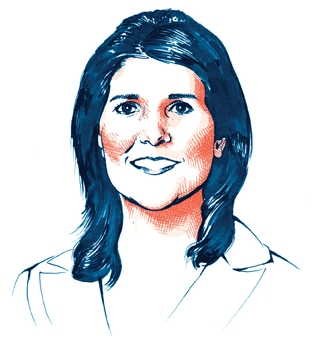
Nimrata “Nikki” Haley, 41
Governor of South Carolina (R)
Elected governor of South Carolina in 2010, Nikki Haley, 41, serves in
one of the nation’s most conservative states — and has gone through
much political turmoil in the process.
An Indian American who was raised a Sikh, Haley later converted
to Methodism but openly admits to attending both religious services,
something her critics have not taken to lightly. During her gubernatorial
campaign, state Sen. Jake Knotts, a Republican, went as far as to
say on Internet political talk show Pub Politics: “We already got one
raghead in the White House. We don’t need another in the governor’s
mansion.” Haley was also falsely called a Hindu during her campaign
for the South Carolina State House in 2004. But she developed a reputation
for beating back the attacks, winning her race and defeating the
house’s longest-serving lawmaker at the time.
Haley has since become a rising star within the Republican Party.
She signed a strict law requiring photo identification in order to vote,
as well as legislation forcing law enforcement to check the immigration
status of suspects who are stopped for other violations. A darling of
the Tea Party, Haley vetoed in the 2012 budget what she called “pork
projects,” which includes preserving African American historical sites.
She also approved a tax cut for small businesses.
This year, Haley denied any speculation about being Mitt Romney’s
running mate — perhaps as part of a plan for a presidential bid in 2016
or beyond.
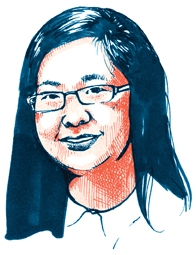
Keish Kim, 21
Immigrant Rights Activist, Georgia
Keish Kim, 21, knows what it feels like to be invisible in the country she
considers home. In 2011, she came out publicly as an undocumented
immigrant and co-founded the Georgia Undocumented Youth Alliance
(GUYA) along with undocumented Latino DREAM activists. GUYA represents
the youngest voice in a coalition of groups fighting Georgia’s
tough laws against illegal immigration, which include banning undocumented
youth from attending the state’s top five public universities and
mandating these youth pay out-of-state tuition for other Georgia schools.
GUYA is the first undocumented youth-led organization in Georgia.
“It’s about us wanting to do something with our lives, asking what can
we do for other young people, what can we do with our time,” Kim said.
The group runs leadership trainings and “know-your-rights” workshops
in communities across Georgia and launches online campaigns to
free undocumented youth who are in detention and awaiting deportation.
When Georgia considered banning undocumented immigrants from
all state-funded higher education in 2012, Kim went to the state capitol
to tell legislators how this would crush the hopes and dreams of those
like her. The bill was defeated last year.
Standing up again for immigrant rights, Kim worked with several
professors in 2011 to create Freedom University, a program that provides
college-level classes for undocumented youth in Georgia. So far,
Freedom University has provided a course on American history with
30 students participating, and up to 80 students have applied to participate
this fall.
“These professors are offering their weekends and weekdays to
work with students to create this learning environment that we are
banned from,” she said. “Most students go not for any sort of accreditation,
but because they want to be in a learning environment. That’s the
beauty of it all.”
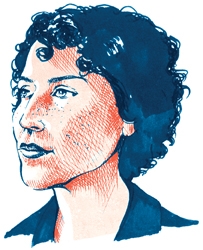
Azadeh Shahshahani, 34
Human Rights Lawyer, Georgia
Azadeh Shahshahani has been a prominent human rights advocate in
the South for eight years. Currently the director of national security and
immigrant rights at the American Civil Liberties Union’s Georgia chapter,
Shahshahani, 34, remains at the forefront of several campaigns to
help those who often do not have a voice within the state’s and nation’s
legal framework.
Shahshahani was among those who led the fight against HB 87, a
Georgia law that closely mirrors the Arizona immigration law, enabling
local law enforcement to check the immigration status of anyone believed
to have committed even a minor infraction. The law passed in
2011 but her work led to a federal court blocking other parts of the law,
including a provision that makes it a crime for anyone to transport or
harbor an undocumented immigrant. In the last year, Shahshahani has
run over 15 forums in rural Georgia, teaching immigrants about their
rights if they get stopped by police.
Much of Shahshahani’s work has also focused on prisoner’s rights.
She authored a report in May 2012 detailing poor conditions in the
privately run prisons used to detain undocumented immigrants. Most of
the problems revolved around abysmal medical care for sick or injured
prisoners. Shahshahani has written prolifically in print media and given
TV interviews on the need for immigration authorities to stop using
private companies to run prisons. These private firms are “committed
to generating money for their investors,” she said.
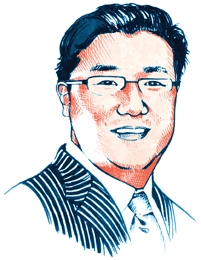
B.J. Pak, 38
Georgia State Representative (R)
A young buck in Georgia’s Republican Party, B.J. Pak, 38, is the first
Korean American ever elected to the Georgia State House. Since he
took office in 2011, Pak has vigorously pursued fixes to legal loopholes
and streamline government processes.
Before serving as a state representative, Pak worked for six years
as a federal prosecutor. He said his federal experience as well as his
strong Catholic faith have shaped his views as a steadfast fiscal and
social conservative.
Pak strongly believes that state and local governments have the
best ability to solve problems and supports a smaller federal role.
He is a strong believer in fiscal responsibility and voted against fellow
Republicans when they wanted to give a tax break to the tourism
industry.
One of his signature achievements has been sponsoring and passing
a law that severely punishes those who file false claims against
the property of government officials in order to ruin the officials’ credit
scores. This has become a tactic favored by sovereign citizens, or those
who do not believe they need to pay taxes or follow federal, state or
local laws. (Pak had a false claim lodged against him during his time as
a federal prosecutor.)
Pak walks a fine line on the immigration debate. He helped defeat
an English-only driving test bill by lobbying his fellow Republicans on
the harm this would create for immigrant communities. He also favors
a solution for undocumented children — the so-called “DREAMers” — to
go to college because: “They’re practically Americans and came here
through no fault of their own,” he said. But he strongly supported HB 87,
Georgia’s version of Arizona’s immigration law, because he feels national
immigration laws need to be enforced so that no incentive exists for people
to break it. He believes the 12 million “illegal” immigrants in the US
have prolonged wait times for those seeking entry through legal means.
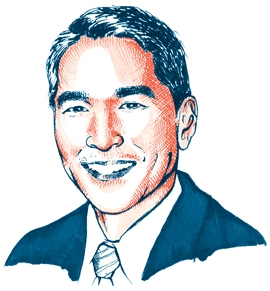
Alex Wan, 45
Atlanta City Councilman (D)
In 2010, Alex Wan became the first Asian American member of the
Atlanta City Council as well as its first openly gay councilman.
Since taking office for this part-time public service role, the
45-year-old Democrat has stressed fiscal responsibility in order to rectify
the dire financial situation that Atlanta has struggled with since the
2008 financial crisis. He serves on the powerful Finance/Executive
Committee and was instrumental in negotiating a pension reform plan
in 2011 that will save Atlanta an estimated $500 million over the next
30 years.
Wan also pushed for other solutions to boost the financial security
of the city. He voted, successfully, to sell City Hall East, a massive
complex that was never more than a third of the way filled by city offices.
Wan counts the increase in the city’s reserves from $7 million in
2010 to nearly $100 million today as proof of his and the city’s fiscal
prudence.
Prior to his public service, Wan ran an architecture-engineering
firm for 16 years. He was also very involved in his community and started
For the Kid in All of Us, a nonprofit that collects toys and school supplies
for smaller organizations that serve low-income children. Since its
founding, the organization has donated 35,000 toys and gift cards as
well as 7,100 backpacks filled with school supplies, and raised more
than $470,000.
Wan switched to the nonprofit sector full time in 2009, saying he
wanted to “follow his heart and do the work that I looked forward to
doing every night after I got home.” He is currently the director of development
for Emory University Libraries.
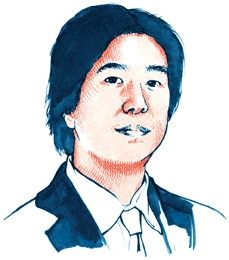
Ramey Ko, 32
Municipal Judge and Activist, Texas (D)
Ramey Ko’s name has become synonymous with Democratic politics
in Austin, TX. The 32-year-old political activist and blogger, now a municipal
judge for the city of Austin, sits on at least eight boards and
commissions either on the city or national level.
Ko’s political ambitions began when he started the website Asian
Americans for Obama in 2006, which served as the focal point for the
API community to rally behind Obama’s first campaign for the White
House.
Ko is a member of the White House Advisory Commission on Asian
Americans, where he has worked to get federal agencies, such as
the Labor, Education, and Health and Human Services departments,
to collect statistics on separate API groups in hopes of breaking the
model minority myth.
He also serves as the vice president of Capital Area Democrats,
Austin’s de facto Democratic Party. In this role, he chips away at the
tall task of turning Texas into a blue state by registering Democraticleaning
people in Austin to vote. He believes that there are more
Democrats than Republicans in Texas; the challenge is to get them
to turn out.
In 2009, he led the public opposition against a bill that required all
Texans to show photo ID to vote. The hearing was made famous when,
after Ko suggested that Asian names are often spelled differently between
their IDs and voter registrations, state Rep. Betty Brown told Ko
that Asians should “adopt a name that we could deal with more readily
here.” (Brown eventually apologized after pressure from Ko and other
API leaders.) The voter ID law was reintroduced and passed in 2011,
but is currently blocked by federal court.
During the day, Ko works on cases for the immigration law firm
Jung Wakefield PLLC, where he is a partner. At night, he can be found
sitting on the judicial bench at the Austin Municipal Court or teaching
Asian American studies at the University of Texas at Austin.
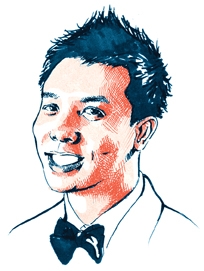
Minh Nguyen, 27
Youth Organizer, Louisiana
Through the tumultuous times of Hurricane Katrina and the BP oil spill
in the gulf, the Vietnamese community in New Orleans has had a constant
advocate: Minh Nguyen.
Nguyen, 27, founded the Vietnamese American Young Leaders
Association (VAYLA), when, during his senior year in college, the city
of New Orleans proposed to put a dump for Katrina-caused debris in
New Orleans East, where most of the Vietnamese community lives. By
organizing the community and lobbying local leaders, Nguyen successfully
pushed then-Mayor Ray Nagin to drop the proposal.
Since then, VAYLA has served a key role in uniting the Vietnamese
community — which is about 7,000-strong in the neighborhood of New
Orleans East — as it faces constant headwinds on the issues of education,
health and public transport. VAYLA runs workshops to teach youth
in the community to organize around these issues, thereby providing
the older generation of Vietnamese, many of whom face language barriers,
a voice through the younger, US-raised generation.
The BP oil spill devastated the community, since many Vietnamese
worked in the fishing and seafood industries. During these tough times,
Nguyen’s VAYLA did a survey that measured the impact of the oil spill
on the community’s livelihood and whether the community faced language
barriers to access the federal programs and compensation
schemes that came out of that crisis. Nguyen’s effort culminated in a
10-minute documentary that was brought to Washington, DC, to educate
lawmakers and bureaucrats on the plight of the Vietnamese community
in the oil spill aftermath.
Nguyen has given his community unparalleled access to the city’s
leaders and managers through his six-plus years of activism. He now sits
on the city health commission and counts the deputy mayor as his friend.
His newest efforts focus on improving education quality and English
as a Second Language access for Vietnamese students, and making
sure students have adequate transportation to get to these programs.
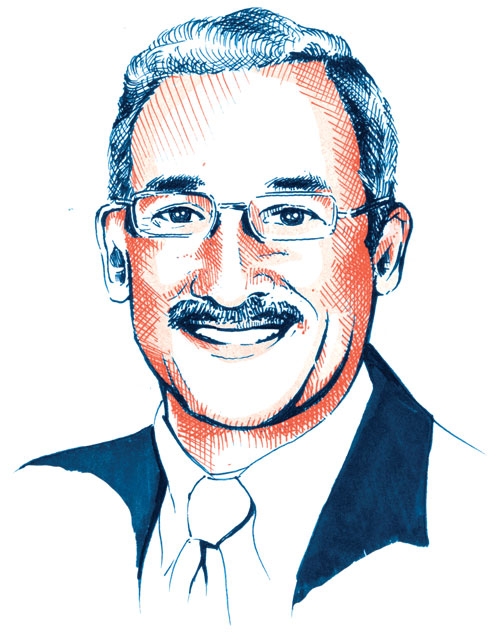
Robert “Bobby” Scott, 65
US Representative, Virginia (D)
While Bobby Scott, 65, may not have the national appeal of the
more heavy hitters of the South, he has the unique distinction of
being the first African American representative from Virginia since
Reconstruction. With a maternal grandfather of Filipino descent, Scott
is also the first Filipino American voting member of Congress in United
States history (the Philippines sent non-voting representatives when it
was a US colony).
One of Scott’s signature achievements was to successfully advocate
for benefits for Filipino World War II veterans. A veterans compensation
fund was passed as part of the 2009 stimulus package, with
Congress approving a $198 million appropriation. “Our Filipino World
War II veterans have waited far too long for the benefits they were
promised over 60 years ago,” he said. (Veterans have since sued the
government for excluding veterans’ widows and rejecting too many applicants
because they could not meet the fund’s strict documentation
standards.)
He has voted with Democrats 94 percent of the time, and campaigned
with Obama in Virginia in 2012 in hopes of turning the state
blue again. Because Scott has won Virginia’s 3rd District with at least
69 percent of the vote since 1992, his seat is secure, leaving him room
to take chances and grow politically.
Ivan Natividad is a reporter covering politics for Hyphen. Lin Yang is Hyphen’s
politics editor.










Comments